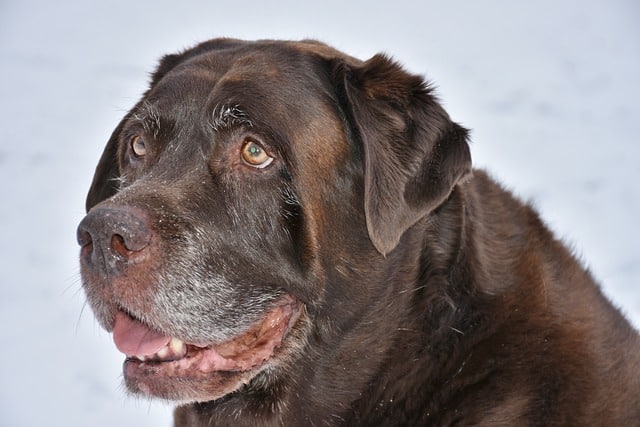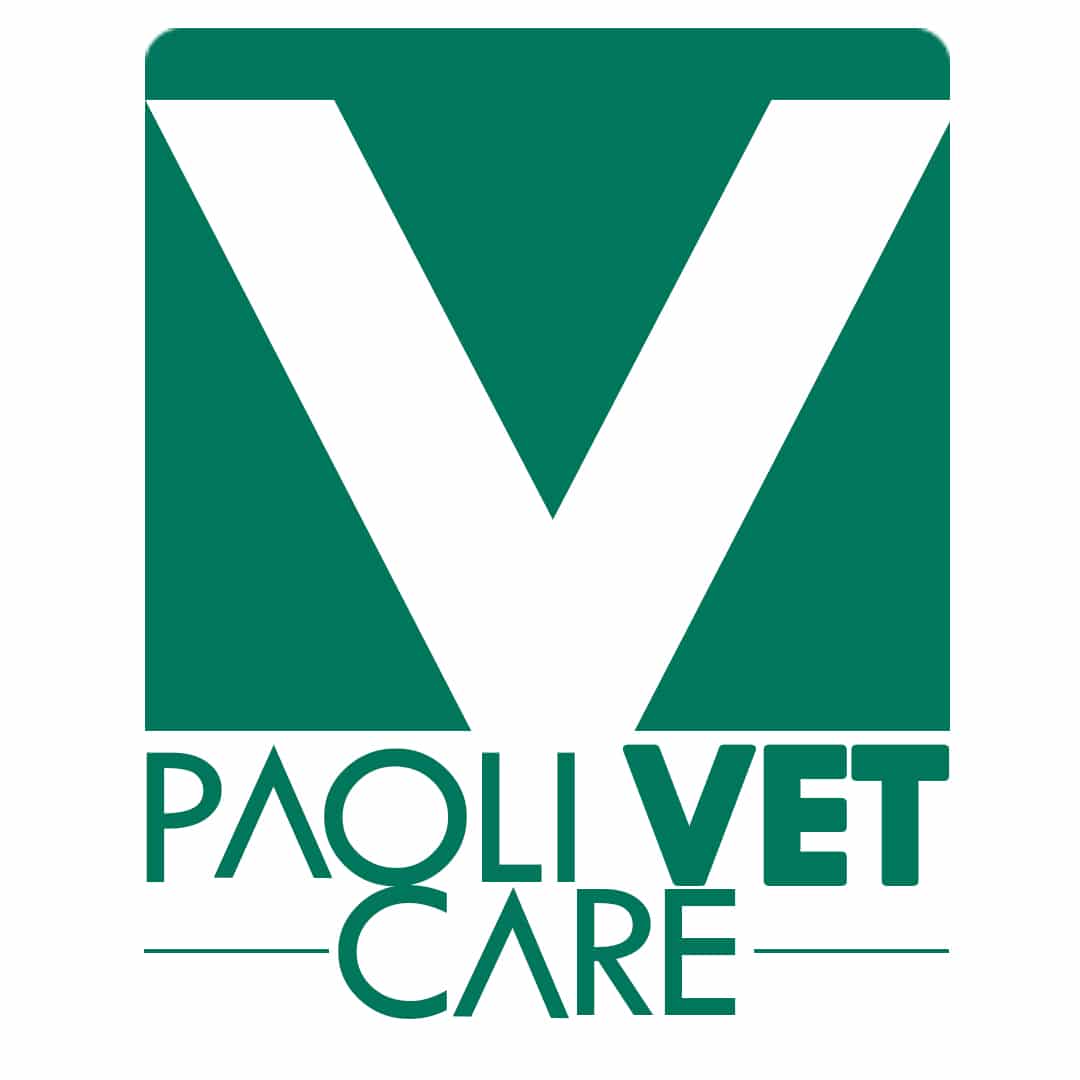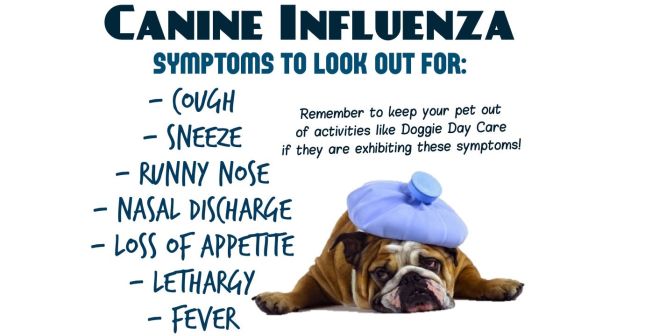TL;DR: There is currently a shortage of canine influenza vaccines.
Paoli Vetcare is recommending prioritizing regular daycare participants and dogs at risk of severe disease or death if they get infected.
Especially if you will be boarding, and your dog is high risk, plan to schedule your dog soon.
High risk categories are detailed below.
The CDC recommends taking precautions to help protect your pet and mitigate the spread of canine influenza—this includes washing your hands, keeping your dog away from sick dogs, washing your pet’s belongings, and getting your dog vaccinated.
Overview
Table of Contents
We’ve been dealing with a major shortage of canine influenza vaccine for a while. There are a couple of different strains of dog-adapted flu internationally, but currently we’re really just worried about H3N2. This strain is present in Asia and the US (to which it was imported from Asia).
Canine flu is different from human flu in that it’s not particularly seasonal, and it’s not as widely distributed. In the US, we see sporadic cases and outbreaks that seem to jump around the country, often causing local outbreaks that tend to burn out. We saw an unprecedented outbreak of canine respiratory disease in our area during the summer of 2022.
Canine flu vaccines are reasonably good at what they’re designed to do — reduce the likelihood and severity of disease. They’re not meant to stop the spread of the virus altogether, or contain an outbreak. They’re used to reduce severe impacts on dogs that get infected.
The canine flu is highly transmissible — almost all dogs exposed to the virus will get it — and all dogs can benefit from vaccination; but that is not going to happen right now due to the shortage. The initial vaccine protocol is two injections 2 – 4 weeks apart, with an annual booster. A dog is not considered protected until 14 days after the second dose.
Symptoms of Canine Influenza
There are a number of signs that can point to your dog having canine influenza. From respiratory changes to lack of energy, your dog might be on the onset of getting sick. If you notice any of the signs below, you should take your dog to your local veterinarian immediately for a checkup. If left unchecked, canine influenza can worsen, and your pet can suffer additional symptoms or contract canine pneumonia.
Symptoms of canine influenza include:
Lack of energy and general lethargy
Loud hacking cough or sneezing
Less of an appetite
Fever
Respiratory issues, including rapid breathing or difficulty breathing
Runny nose
Leaky or runny eyes
Signs of mucus
If your dog is showing any signs of canine influenza, seek out veterinary services and make an appointment ASAP.
High Risk Dogs that Should Be Vaccinated ASAP
Based on the recommendations of Dr. Scott Weese, Chief of Infection Control at the Ontario Veterinary College, we will schedule dogs in the following groups for immediate access to canine influenza vaccination:
✅ ✅ ✅ Regular daycare participants
It’s strongly recommended that you vaccinate your dog—for a number of reasons and scenarios—but if you frequently drop off your pet for doggy daycare, it’s important to have them vaccinated against both existing strains of dog flu. If your dog is spending time around other animals they could spread their disease if unvaccinated, and many pet boarding centers require that your pets have their updated shots. Many veterinarians also require that their patients be vaccinated. Since vaccinating your dog lowers its risk of getting the canine flu, it exists as a line of defense against both your dog becoming ill and passing any illness to other daycare pets.
✅ ✅ ✅ Puppies

— 6 weeks to 1 year of age
Puppies, especially, should be up-to-date on their vaccines, and this goes double for any puppy that’s regularly boarded at doggy daycare. Most daycare facilities will require that your puppy have their updated shots before boarding, to ensure that they are protected from the other dogs and to decrease the risk of passing on any symptoms or illnesses. Veterinarians recommend that you give your puppy their shots as soon as possible.
✅ ✅ ✅ Pregnant
Pregnant dogs are at an even higher risk of illness, especially when it comes to the symptoms of canine influenza. If you have to board your pregnant dog with a doggy daycare for any reason, it’s a good idea to get their shots updated. The best way to mitigate the risk of contracting the illness is to have your dog vaccinated. If your dog hasn’t been recently vaccinated and needs their shots updated, book an appointment with your local veterinarian.
✅ ✅ ✅ Immunocompromised:
-
- Cancer
- Diabetes
- Chronic medications — e.g. apoquel, steroids (prednisone andprednisolone), cyclosporine, azathioprine, chlorambucil,cyclophosphamide, lomustine (CCNU), mycophenolate, leflunomide
- Autoimmune disease — e.g. autoimmune hemolytic anemia (AIHA) orsystemic lupus erythematosus (SLE)Underlying heart or lung disease:
-
- Heart failure
- Chronic bronchitis
- Dilated cardiomyopathy
- Severe congenital heart defects — e.g. patent ductus arteriosus(PDA), pulmonic stenosis, and aortic stenosis
- Pneumonia
- Pulmonary fibrosis
- Pulmonary hypertension
- Heartworm disease
If your dog is immunocompromised and you plan to board them at a doggy daycare for any amount of time, it’s important to ensure that their shots are up-to-date. You can schedule an appointment with your local vet and have your dog vaccinated against the current strains of canine influenza, which will give you peace of mind and mitigate any risk against your pup.
✅ ✅ ✅ Senior dogs:
-
- Small breed dogs (like Chihuahuas or Poodles) are generally considered senior at around 10 to 12 years of age.
- Medium breed dogs (like Border Collies or Bulldogs) are typically considered senior at around 8 to 10 years of age.
- Large breed dogs (like German Shepherds or Labradors) are usually considered senior at around 6 to 8 years of age.
- Giant breed dogs (like Great Danes or Saint Bernards) are generally considered senior at around 5 to 6 years of age.

Senior dogs are especially at risk of contracting canine influenza and other illnesses, and are often more immunocompromised than younger dogs while in a daycare or boarding environment. Take care of your senior dog by scheduling an appointment with your local veterinarian to have their shots updated, which minimizes the risk of contracting illness or symptoms.
✅ ✅ ✅ Brachycephalic breeds (smush-faced):
-
- English Bulldog
- French Bulldog
- Pug
- Boston Terrier
- Pekingese
- Shih Tzu
- Lhasa Apso
- Brussels Griffon
- Japanese Chin
- Boxer
- Bullmastiff
- Affenpinscher
- Cavalier King Charles Spaniel
- Dogue de Bordeaux
- Brussels Griffon
- Tibetan Spaniel
Brachycephalic dogs, such as Bulldogs, Boxers, Terriers, Pugs, and Shih Tzus, are recommended to have their updated canine influenza vaccines especially if they are in prolonged social situations such as daycares and boarding facilities. Most daycares will require proof of vaccination, and Brachycephalic breeds are susceptible to respiratory diseases, meaning that certain symptoms of canine influenza can be detrimental to their health.
Canine Influenza Vaccine Shortage
As of the early months of 2023, there have been reports of a canine vaccine shortage in PA. While most cases of canine influenza are not life-threatening and may resolve on their own in a period of weeks, some cases can result in secondary bacterial infections and result in more severe cases. In rarer circumstances, your dog might contract canine pneumonia as a result of the flu.
There are many common symptoms of canine influenza, such as runny nose, cough, fever, lethargy, and decreased appetite. While the shortages might delay your dog’s vaccine appointment, there are a number of animal drug shortage measures you can take to help them and your veterinarian in the meantime.
Let your vet or daycare know that your dog has not been vaccinated if they have been recently boarded in the area.
Be extra cautious about taking them to dog parks.
Be vigilant about contacting your local veterinarian about vaccine availability.
Update your vet or doggy daycare about any signs of canine influenza symptoms.
If you’re worried your dog has contracted canine influenza, don’t wait for information on the vaccine—schedule an appointment with Main Line Vet & Animal Hospital immediately.
How long does canine influenza vaccine last in dogs?
Any treatment of canine influenza requires veterinary assistance. You should contact your local vet immediately if you believe your dog has contracted the flu, or if they are displaying any known signs of canine influenza. If left untreated, the illness can progress into pneumonia or the symptoms may worsen into more severe problems. Some signs are more obvious than others, such as dog flu vomiting.
Most dogs recover from this illness in 2-3 weeks, but it’s best to not take your chances. Even a healthy dog can be brought low by canine influenza and should be immediately isolated from other dogs. Keep your unhealthy dog away from daycares, grooming facilities, dog parks, and any other place dogs gather. After signs of symptoms, dogs are contagious for another 7-10 days.
Let your veterinarian know that your dog is showing signs of canine influenza and make an appointment as soon as possible. If you know that your dog is going to a hospital or clinic with signs of the flu, call ahead to let them know. Many places will require you to follow a specific protocol to reduce the risk of spreading the disease to other dogs, such as waiting in your car until the examination or using a special entrance/exit.
Keep your dog isolated and at home for up to 4 weeks, until you are certain the illness has run its course. It’s important to keep up-to-date on detailed information about viruses and vaccines.
Does my dog really need a canine influenza vaccine?
It’s a good idea to have your dog vaccinated against canine influenza, especially if it’s recommended by your veterinarian. In some cases, your dog will have to be vaccinated to join a daycare or enter a grooming facility. Any high-risk group or high-risk breed should be vaccinated, and giving your dog their shots will help keep any place they visit sanitized and safe. Any dog that regularly participates in social activities should be fully vaccinated with the core and canine influenza vaccines.
Just like us humans, it’s a good idea to update your dog’s vaccines yearly and to have their booster shots administered per your veterinarian’s recommendation.
Here are some other Key Facts about Canine Influenza (Dog Flu) you should know.
How to prevent canine influenza
There are a number of things you can do to minimize the risk of canine influenza and prevent the spread of the disease. Since canine influenza is highly contagious, it’s best to keep your dog from social situations if you believe it has symptoms, or if your pet is showing signs of symptoms.
Here are some tips for preventing the risk of canine influenza:
Keep your dog away from dogs you suspect are infected.
Don’t let your dog come into contact with contaminated items.
Be wary of people who have recently had contact with an infected dog.
Most dogs who are exposed to canine influenza will contract it, and about 80% of them will show symptoms of the illness. Dogs are contagious for 3-4 days before showing symptoms and may spread the disease for up to 10 days after recovery.








